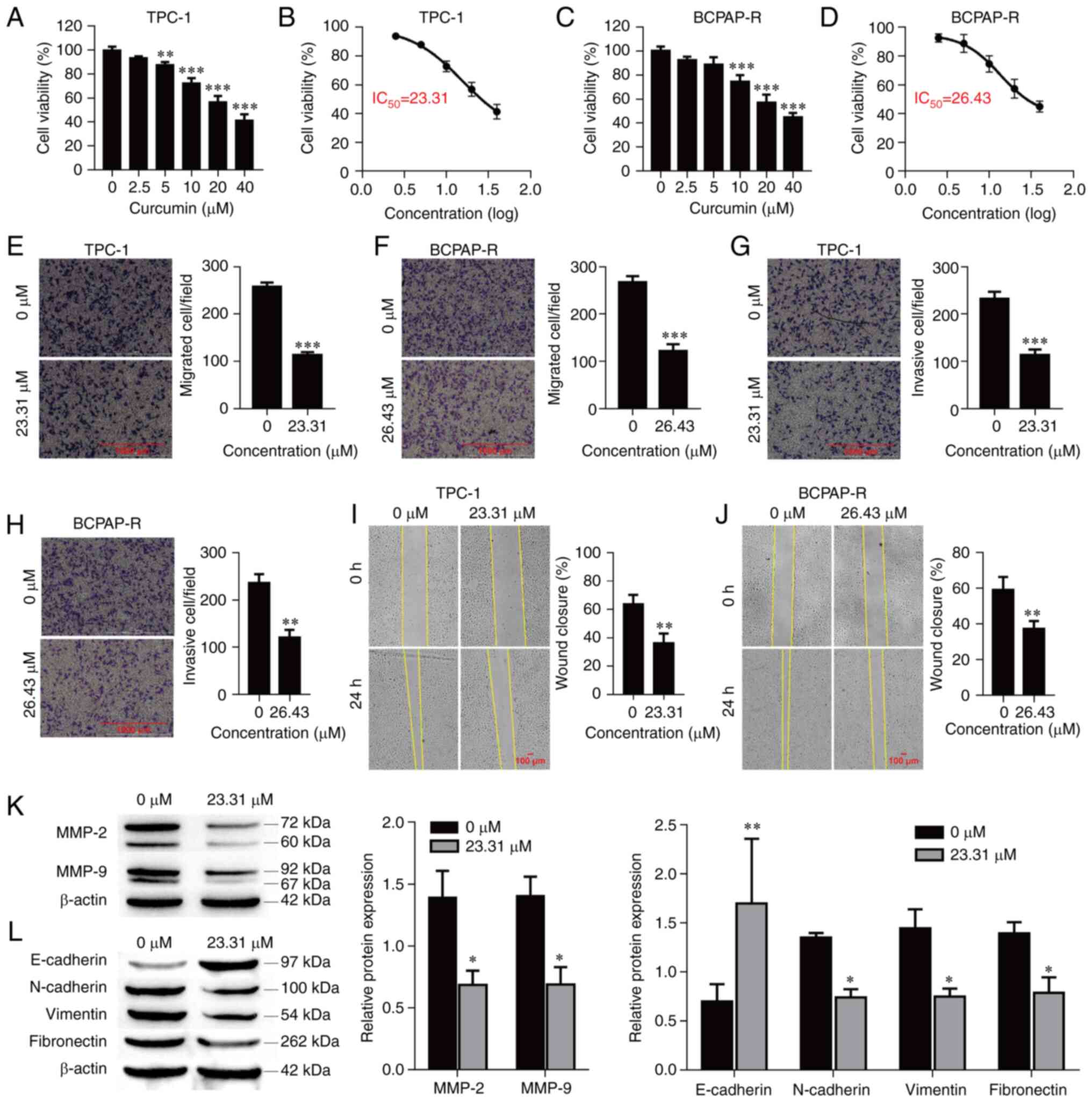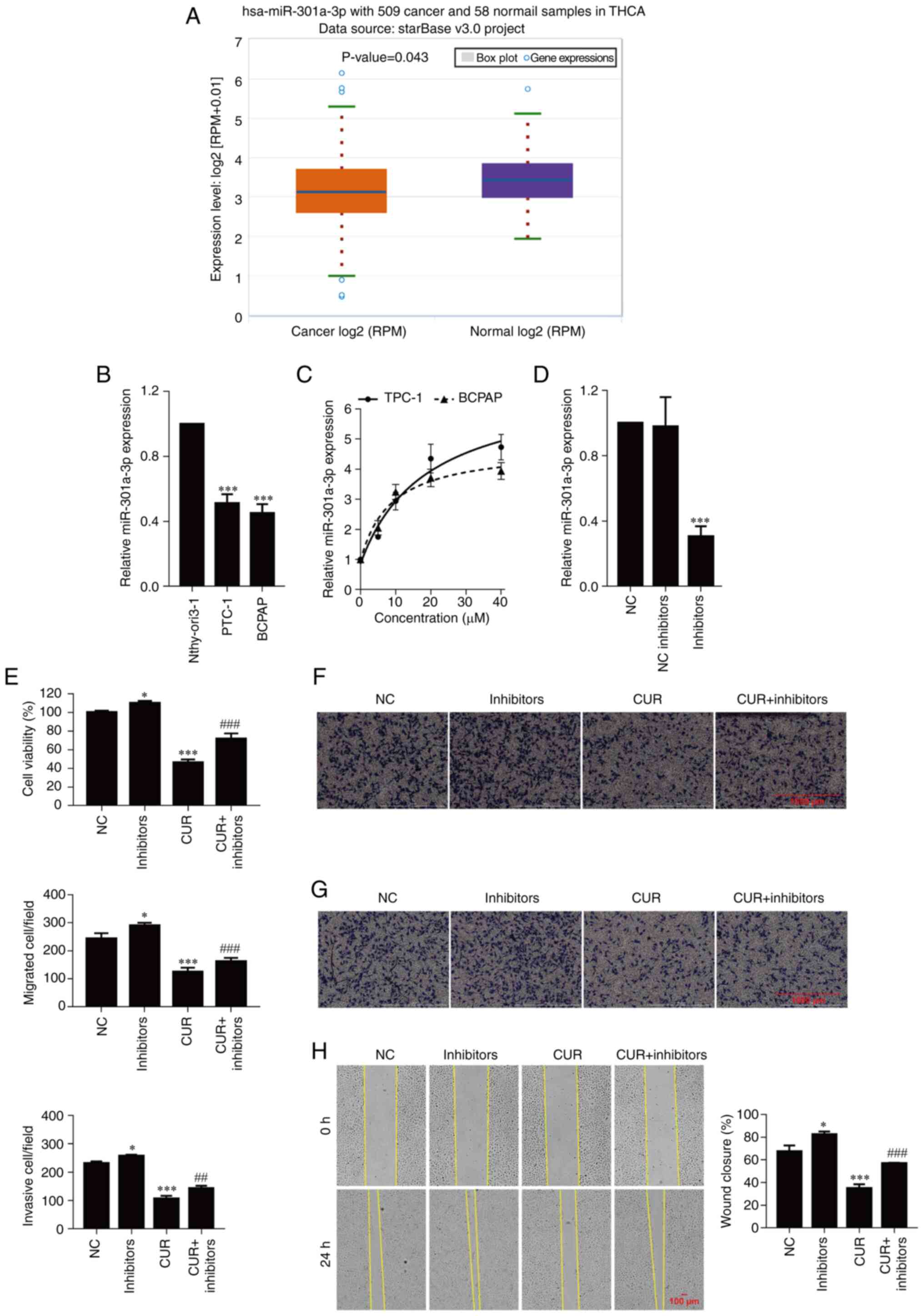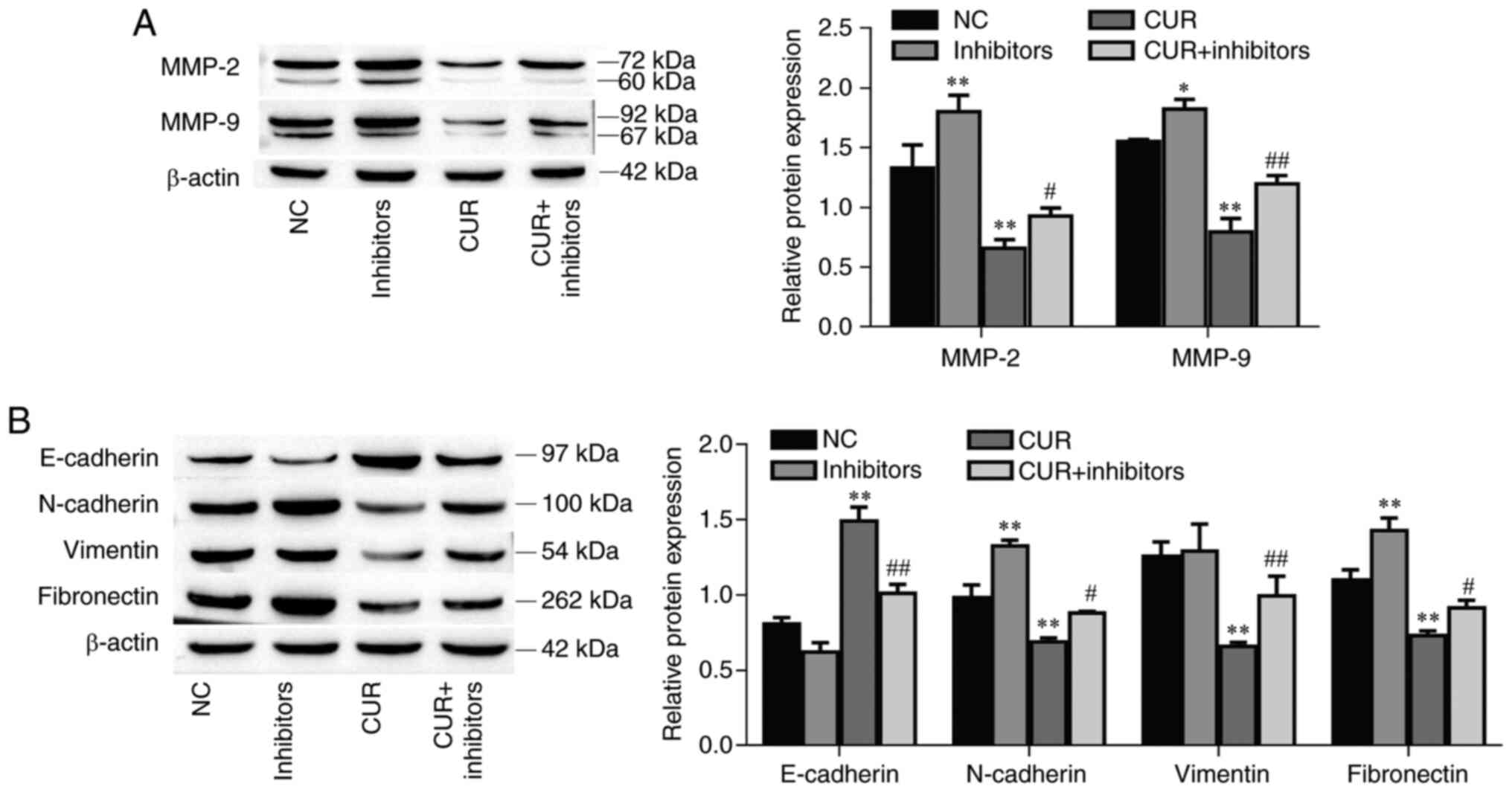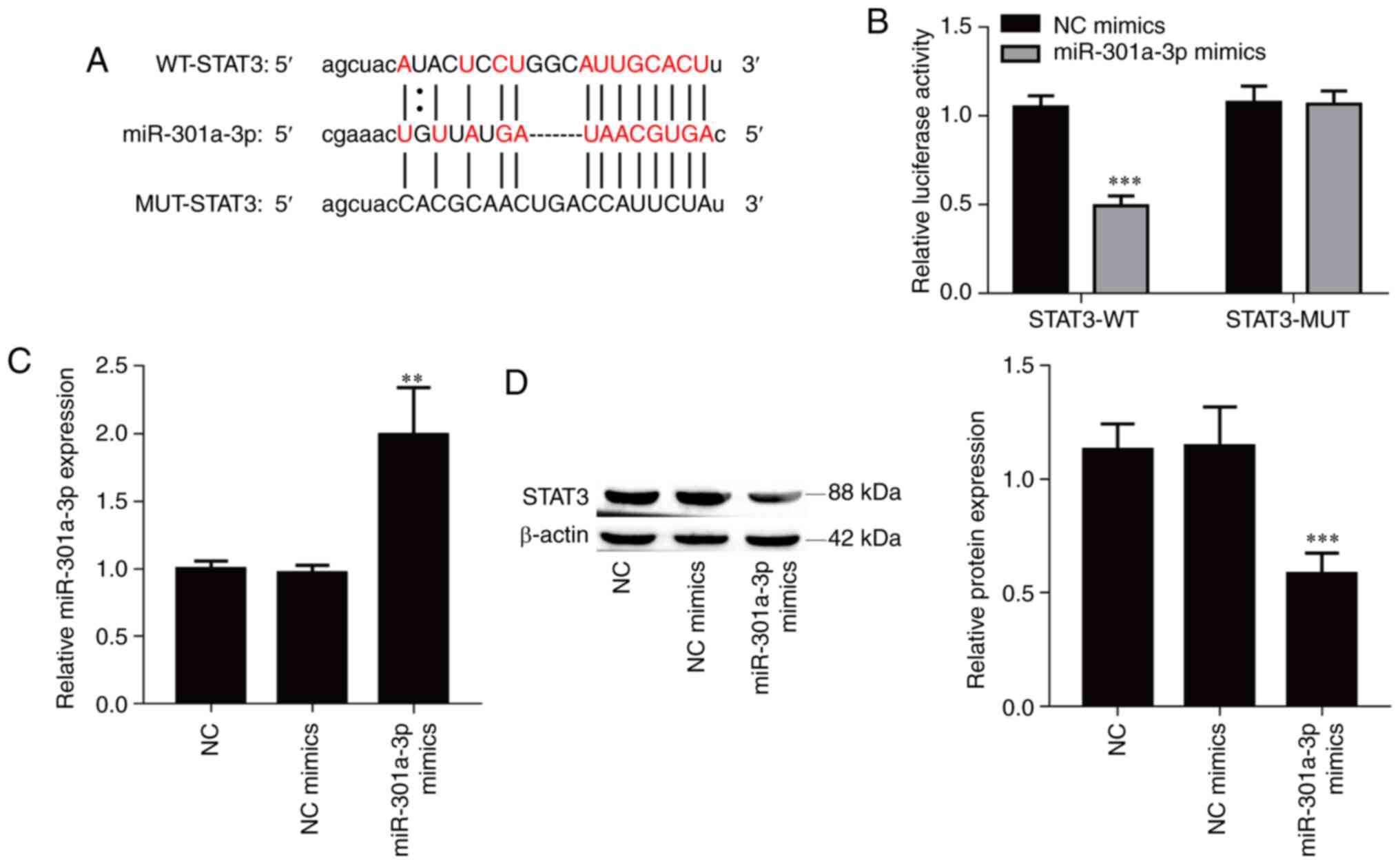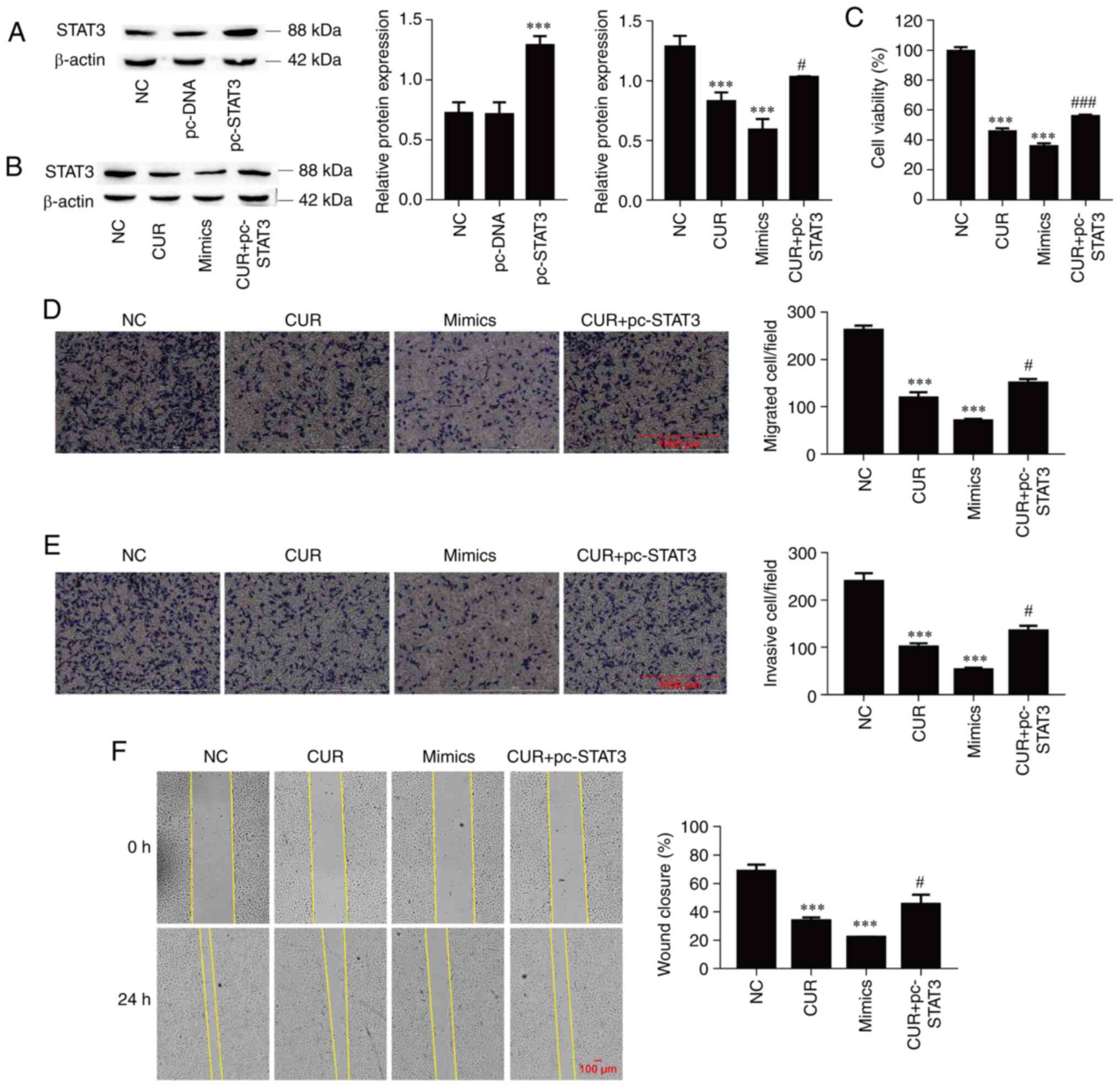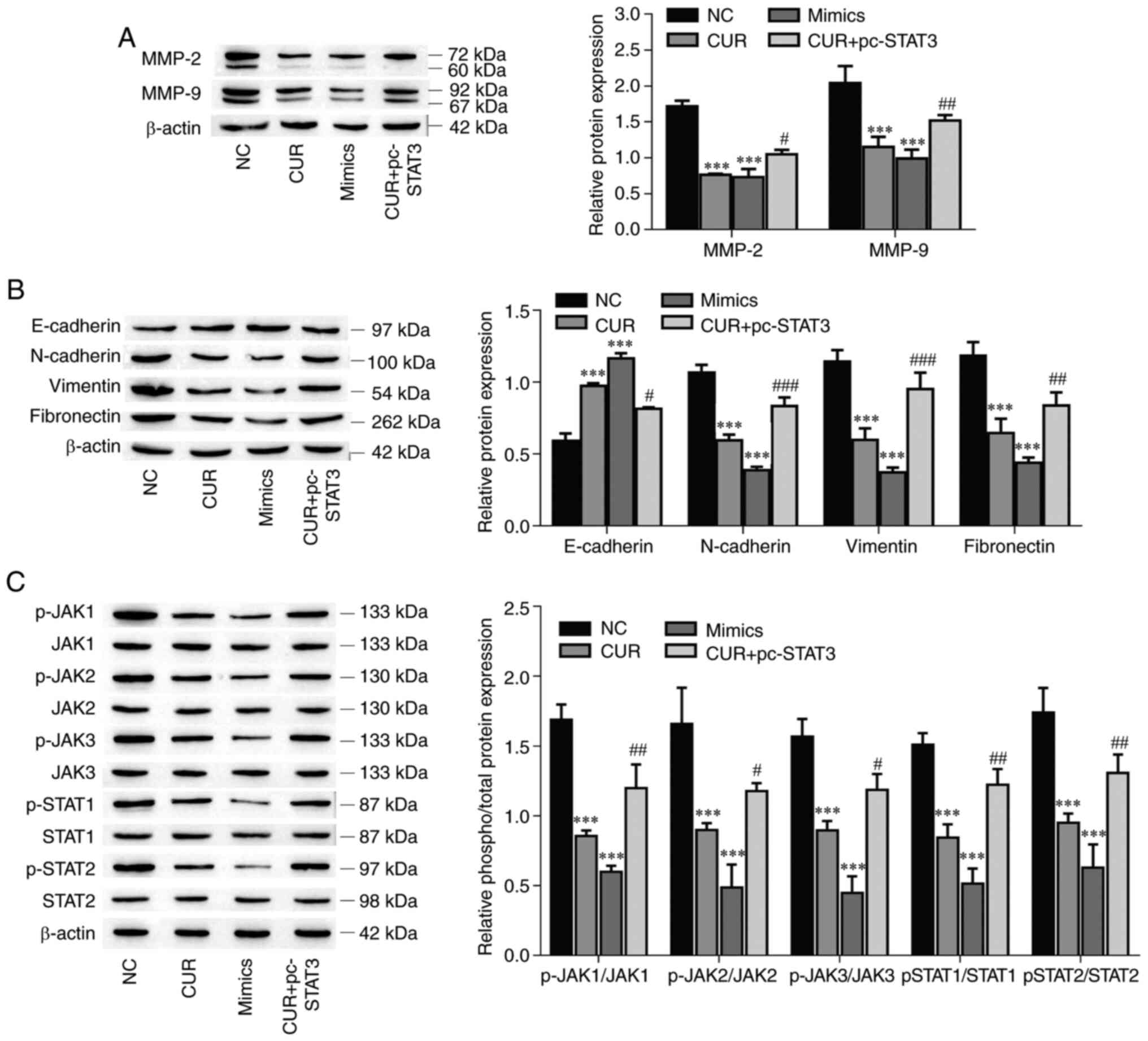|
1
|
Siegel RL, Miller KD and Jemal A: Cancer
statistics, 2020. CA Cancer J Clin. 70:7–30. 2020.PubMed/NCBI View Article : Google Scholar
|
|
2
|
Wang J, Yu F, Shang Y, Ping Z and Liu L:
Thyroid cancer: Incidence and mortality trends in China, 2005-2015.
Endocrine. 68:163–173. 2020.PubMed/NCBI View Article : Google Scholar
|
|
3
|
Laha D, Nilubol N and Boufraqech M: New
therapies for advanced thyroid cancer. Front Endocrinol (Lausanne).
11(82)2020.PubMed/NCBI View Article : Google Scholar
|
|
4
|
Kumar A and Bal CS: Differentiated thyroid
cancer. Indian J Pediatr. 70:707–713. 2003.PubMed/NCBI View Article : Google Scholar
|
|
5
|
Rao SN, Zafereo M, Dadu R, Busaidy NL,
Hess K, Cote GJ, Williams MD, William WN, Sandulache V, Gross N, et
al: Patterns of treatment failure in anaplastic thyroid carcinoma.
Thyroid. 27:672–681. 2017.PubMed/NCBI View Article : Google Scholar
|
|
6
|
Berretta M, Della Pepa C, Tralongo P,
Fulvi A, Martellotta F, Lleshi A, Nasti G, Fisichella R, Romano C,
De Divitiis C, et al: Use of complementary and alternative medicine
(CAM) in cancer patients: An Italian multicenter survey.
Oncotarget. 8:24401–24414. 2017.PubMed/NCBI View Article : Google Scholar
|
|
7
|
Han YG, Ma LG, Zhao L, Feng W and Zheng X:
Rosmarinic inhibits cell proliferation, invasion and migration via
up-regulating miR-506 and suppressing MMP2/16 expression in
pancreatic cancer. Biomed Pharmacother. 115(108878)2019.PubMed/NCBI View Article : Google Scholar
|
|
8
|
Zhao J, Fang Z, Zha Z, Sun Q, Wang H, Sun
M and Qiao B: Quercetin inhibits cell viability, migration and
invasion by regulating miR-16/HOXA10 axis in oral cancer. Eur J
Pharmacol. 847:11–18. 2019.PubMed/NCBI View Article : Google Scholar
|
|
9
|
Perna A, De Luca A, Adelfi L, Pasquale T,
Varriale B and Esposito T: Effects of different extracts of
curcumin on TPC1 papillary thyroid cancer cell line. BMC Complement
Altern Med. 18(63)2018.PubMed/NCBI View Article : Google Scholar
|
|
10
|
Zhou JJ, Zheng JY, Cheng XQ, Xin GZ, Wang
SL and Xie T: Chemical markers' knockout coupled with
UHPLC-HRMS-based metabolomics reveals anti-cancer integration
effects of the curcuminoids of turmeric (Curcuma longa L.)
on lung cancer cell line. J Pharm Biomed Anal.
175(112738)2019.PubMed/NCBI View Article : Google Scholar
|
|
11
|
Buhrmann C, Popper B, Kunnumakkara AB,
Aggarwal BB and Shakibaei M: Evidence that calebin a, a component
of Curcuma longa suppresses NF-B mediated proliferation, invasion
and metastasis of human colorectal cancer induced by TNF-β
(lymphotoxin). Nutrients. 11(2904)2019.PubMed/NCBI View Article : Google Scholar
|
|
12
|
Huang W, Li X, Wang D, Sun Y, Wang Q, Bu Y
and Niu F: Curcumin reduces LPS-induced septic acute kidney injury
through suppression of lncRNA PVT1 in mice. Life Sci.
254(117340)2020.PubMed/NCBI View Article : Google Scholar
|
|
13
|
Huang G, Yan Y, Xu D, Wu J, Xu C, Fu L and
Lin B: Curcumin-loaded simplenanoMOFs@CMFP. A biological
preserving paste with antibacterial properties and long-acting,
controllable release. Food Chem. 337(127987)2021.PubMed/NCBI View Article : Google Scholar
|
|
14
|
Zhang CY, Zhang L, Yu HX, Bao JD, Sun Z
and Lu RR: Curcumin inhibits invasion and metastasis in K1
papillary thyroid cancer cells. Food Chem. 139:1021–1028.
2013.PubMed/NCBI View Article : Google Scholar
|
|
15
|
Mirzaei H, Masoudifar A, Sahebkar A, Zare
N, Sadri Nahand J, Rashidi B, Mehrabian E, Mohammadi M, Mirzaei HR
and Jaafari MR: MicroRNA: A novel target of curcumin in cancer
therapy. J Cell Physiol. 233:3004–3015. 2018.PubMed/NCBI View Article : Google Scholar
|
|
16
|
Zhang L, Cheng X, Xu S, Bao J and Yu H:
Curcumin induces endoplasmic reticulum stress-associated apoptosis
in human papillary thyroid carcinoma BCPAP cells via disruption of
intracellular calcium homeostasis. Medicine (Baltimore).
97(e11095)2018.PubMed/NCBI View Article : Google Scholar
|
|
17
|
Khan AQ, Ahmed EI, Elareer N, Fathima H,
Prabhu KS, Siveen KS, Kulinski M, Azizi F, Dermime S, Ahmad A, et
al: Curcumin-mediated apoptotic cell death in papillary thyroid
cancer and cancer stem-like cells through targeting of the
JAK/STAT3 signaling pathway. Int J Mol Sci. 21(438)2020.PubMed/NCBI View Article : Google Scholar
|
|
18
|
Celano M, Rosignolo F, Maggisano V, Pecce
V, Iannone M, Russo D and Bulotta S: MicroRNAs as biomarkers in
thyroid carcinoma. Int J Genomics. 2017(6496570)2017.PubMed/NCBI View Article : Google Scholar
|
|
19
|
Aragon Han P, Weng CH, Khawaja HT,
Nagarajan N, Schneider EB, Umbricht CB, Witwer KW and Zeiger MA:
MicroRNA expression and association with clinicopathologic features
in papillary thyroid cancer: A systematic review. Thyroid.
25:1322–1329. 2015.PubMed/NCBI View Article : Google Scholar
|
|
20
|
Zhang N, Hu X, Du Y and Du J: The role of
miRNAs in colorectal cancer progression and chemoradiotherapy.
Biomed Pharmacother. 134(111099)2020.PubMed/NCBI View Article : Google Scholar
|
|
21
|
Hu J, Ruan J, Liu X, Xiao C and Xiong J:
MicroRNA-301a-3p suppressed the progression of hepatocellular
carcinoma via targeting VGLL4. Pathol Res Pract. 214:2039–2045.
2018.PubMed/NCBI View Article : Google Scholar
|
|
22
|
Jiao X, Ye J, Wang X, Yin X, Zhang G and
Cheng X: KIAA1199, a target of micoRNA-486-5p, promotes papillary
thyroid cancer invasion by influencing epithelial-mesenchymal
transition (EMT). Med Sci Monit. 25:6788–6796. 2019.PubMed/NCBI View Article : Google Scholar
|
|
23
|
Zhou P, Irving A, Wu H, Luo J, Aguirre J,
Costa M, Khamsuree M, Gerads N and Liu WB: Validation of
microRNA-188-5p inhibition power on tumor cell proliferation in
papillary thyroid carcinoma. Cell Transplant.
29(963689720918300)2020.PubMed/NCBI View Article : Google Scholar
|
|
24
|
Jiao DM, Yan L, Wang LS, Hu HZ, Tang XL,
Chen J, Wang J, Li Y and Chen QY: Exploration of inhibitory
mechanisms of curcumin in lung cancer metastasis using a
miRNA-transcription factor-target gene network. PLoS One.
12(e0172470)2017.PubMed/NCBI View Article : Google Scholar
|
|
25
|
Allegri L, Rosignolo F, Mio C, Filetti S,
Baldan F and Damante G: Effects of nutraceuticals on anaplastic
thyroid cancer cells. J Cancer Res Clin Oncol. 144:285–294.
2018.PubMed/NCBI View Article : Google Scholar
|
|
26
|
Carthew RW and Sontheimer EJ: Origins and
mechanisms of miRNAs and siRNAs. Cell. 136:642–655. 2009.PubMed/NCBI View Article : Google Scholar
|
|
27
|
Morgan EL and Macdonald A: Manipulation of
JAK/STAT signalling by high-risk HPVs: Potential therapeutic
targets for HPV-associated malignancies. Viruses.
12(977)2020.PubMed/NCBI View Article : Google Scholar
|
|
28
|
Qing X, Tan GL, Liu HW, Li W, Ai JG, Xiong
SS, Yang MQ and Wang TS: LINC00669 insulates the JAK/STAT
suppressor SOCS1 to promote nasopharyngeal cancer cell
proliferation and invasion. J Exp Clin Cancer Res.
39(166)2020.PubMed/NCBI View Article : Google Scholar
|
|
29
|
Couto JP, Daly L, Almeida A, Knauf JA,
Fagin JA, Sobrinho-Simões M, Lima J, Máximo V, Soares P, Lyden D
and Bromberg JF: STAT3 negatively regulates thyroid tumorigenesis.
Proc Natl Acad Sci USA. 109:E2361–E2370. 2012.PubMed/NCBI View Article : Google Scholar
|
|
30
|
Yang L, Tan Z, Li Y, Zhang X, Wu Y, Xu B
and Wang M: Insulin-like growth factor 1 promotes proliferation and
invasion of papillary thyroid cancer through the STAT3 pathway. J
Clin Lab Anal. 34(e23531)2020.PubMed/NCBI View Article : Google Scholar
|
|
31
|
Zhang T, He L, Wang Z, Dong W, Sun W, Qin
Y, Zhang P and Zhang H: Calcitriol enhances Doxorubicin-induced
apoptosis in papillary thyroid carcinoma cells via regulating
VDR/PTPN2/p-STAT3 pathway. J Cell Mol Med. 24:5629–5639.
2020.PubMed/NCBI View Article : Google Scholar
|
|
32
|
Kong D, Li A, Liu Y, Cui Q, Wang K, Zhang
D, Tang J, Du Y, Liu Z, Wu G and Wu K: SIX1 Activates STAT3
signaling to promote the proliferation of thyroid carcinoma via
EYA1. Front Oncol. 9(1450)2019.PubMed/NCBI View Article : Google Scholar
|
|
33
|
Zhou Y, Liu S, Luo Y, Zhang M, Jiang X and
Xiong Y: LncRNA MAPKAPK5-AS1 promotes proliferation and migration
of thyroid cancer cell lines by targeting miR-519e-5p/YWHAH. Eur J
Histochem. 64(3177)2020.PubMed/NCBI View Article : Google Scholar
|
|
34
|
Sun Y, Zhang L and Zhang S:
MicroRNA-124-3p inhibits tumourigenesis by targeting
mitogen-activated protein kinase 4 in papillary thyroid carcinoma.
Cell Biochem Funct. 38:1017–1024. 2020.PubMed/NCBI View Article : Google Scholar
|
|
35
|
Livak KJ and Schmittgen TD: Analysis of
relative gene expression data using real-time quantitative PCR and
the 2(-Delta Delta C(T)) method. Methods. 25:402–408.
2001.PubMed/NCBI View Article : Google Scholar
|
|
36
|
Li JH, Liu S, Zhou H, Qu LH and Yang JH:
StarBase v2.0: Decoding miRNA-ceRNA, miRNA-ncRNA and protein-RNA
interaction networks from large-scale CLIP-Seq data. Nucleic Acids
Res. 42 (Database Issue):D92–D97. 2014.PubMed/NCBI View Article : Google Scholar
|
|
37
|
Wang Z, Jensen MA and Zenklusen JC: A
Practical guide to the cancer genome atlas (TCGA). Methods Mol
Biol. 1418:111–141. 2016.PubMed/NCBI View Article : Google Scholar
|
|
38
|
Owen KL, Brockwell NK and Parker BS:
JAK-STAT signaling: A double-edged sword of immune regulation and
cancer progression. Cancers. 11(2002)2019.PubMed/NCBI View Article : Google Scholar
|
|
39
|
Giordano A and Tommonaro G: Curcumin and
cancer. Nutrients. 11(2376)2019.PubMed/NCBI View Article : Google Scholar
|
|
40
|
Schwertheim S, Wein F, Lennartz K, Worm K,
Schmid KW and Sheu-Grabellus SY: Curcumin induces G2/M arrest,
apoptosis, NF-κB inhibition, and expression of differentiation
genes in thyroid carcinoma cells. J Cancer Res Clin Oncol.
143:1143–1154. 2017.PubMed/NCBI View Article : Google Scholar
|
|
41
|
Zhang CY, Zhang L, Yu HX, Bao JD and Lu
RR: Curcumin inhibits the metastasis of K1 papillary thyroid cancer
cells via modulating E-cadherin and matrix metalloproteinase-9
expression. Biotechnol Lett. 35:995–1000. 2013.PubMed/NCBI View Article : Google Scholar
|
|
42
|
Zhang L, Cheng X, Gao Y, Bao J, Guan H, Lu
R, Yu H, Xu Q and Sun Y: Induction of ROS-independent DNA damage by
curcumin leads to G2/M cell cycle arrest and apoptosis in human
papillary thyroid carcinoma BCPAP cells. Food Funct. 7:315–325.
2016.PubMed/NCBI View Article : Google Scholar
|
|
43
|
Liu L, Fu Y, Zheng Y, Ma M and Wang C:
Curcumin inhibits proteasome activity in triple-negative breast
cancer cells through regulating p300/miR-142-3p/PSMB5 axis.
Phytomedicine. 78(153312)2020.PubMed/NCBI View Article : Google Scholar
|
|
44
|
Nozari E, Moradi A and Samadi M: Effect of
atorvastatin, curcumin, and quercetin on miR-21 and miR-122 and
their correlation with TGFβ1 expression in experimental liver
fibrosis. Life Sci. 259(118293)2020.PubMed/NCBI View Article : Google Scholar
|
|
45
|
Sharifi-Rad J, Rayess YE, Rizk AA, Sadaka
C, Zgheib R, Zam W, Sestito S, Rapposelli S, Neffe-Skocińska K,
Zielińska D, et al: Turmeric and its major compound curcumin on
health: Bioactive effects and safety profiles for food,
pharmaceutical, biotechnological and medicinal applications. Front
Pharmacol. 11(01021)2020.PubMed/NCBI View Article : Google Scholar
|
|
46
|
Ashrafizadeh M, Rafiei H, Mohammadinejad
R, Afshar EG, Farkhondeh T and Samarghandian S: Potential
therapeutic effects of curcumin mediated by JAK/STAT signaling
pathway: A review. Phytother Res. 34:1745–1760. 2020.PubMed/NCBI View Article : Google Scholar
|
|
47
|
Wang N, Feng T, Liu X and Liu Q: Curcumin
inhibits migration and invasion of non-small cell lung cancer cells
through up-regulation of miR-206 and suppression of PI3K/AKT/mTOR
signaling pathway. Acta Pharm. 70:399–409. 2020.PubMed/NCBI View Article : Google Scholar
|
|
48
|
Zhang L, Zhang Y, Zhu H, Sun X, Wang X, Wu
P and Xu X: Overexpression of miR-301a-3p promotes colorectal
cancer cell proliferation and metastasis by targeting deleted in
liver cancer-1 and runt-related transcription factor 3. J Cell
Biochem. 120:6078–6089. 2019.PubMed/NCBI View Article : Google Scholar
|
|
49
|
Xia X, Zhang K, Luo G, Cen G, Cao J, Huang
K and Qiu Z: Downregulation of miR-301a-3p sensitizes pancreatic
cancer cells to gemcitabine treatment via PTEN. Am J Transl Res.
9:1886–1895. 2017.PubMed/NCBI
|
|
50
|
Zhou S, Zhang S, Shen H, Chen W, Xu H,
Chen X, Sun D, Zhong S, Zhao J and Tang J: Curcumin inhibits cancer
progression through regulating expression of microRNAs. Tumour
Biol. 39(1010428317691680)2017.PubMed/NCBI View Article : Google Scholar
|
|
51
|
Spadotto V, Giambruno R, Massignani E,
Mihailovic M, Maniaci M, Patuzzo F, Ghini F, Nicassio F and Bonaldi
T: PRMT1-mediated methylation of the microprocessor-associated
proteins regulates microRNA biogenesis. Nucleic Acids Res.
48:96–115. 2020.PubMed/NCBI View Article : Google Scholar
|
|
52
|
Saini S, Arora S, Majid S, Shahryari V,
Chen Y, Deng G, Yamamura S, Ueno K and Dahiya R: Curcumin modulates
microRNA-203-mediated regulation of the Src-Akt axis in bladder
cancer. Cancer Prev Res (Phila). 4:1698–1709. 2011.PubMed/NCBI View Article : Google Scholar
|
|
53
|
Li Y, Sun W, Han N, Zou Y and Yin D:
Curcumin inhibits proliferation, migration, invasion and promotes
apoptosis of retinoblastoma cell lines through modulation of
miR-99a and JAK/STAT pathway. BMC Cancer. 18(1230)2018.PubMed/NCBI View Article : Google Scholar
|
|
54
|
Kim MJ, Park KS, Kim KT and Gil EY: The
inhibitory effect of curcumin via fascin suppression through
JAK/STAT3 pathway on metastasis and recurrence of ovary cancer
cells. BMC Women's Health. 20(256)2020.PubMed/NCBI View Article : Google Scholar
|
|
55
|
Wu Z, Liu H, Sun W, Du Y, He W, Guo S,
Chen L, Zhao Z, Wang P, Liang H and Deng J: RNF180 mediates STAT3
activity by regulating the expression of RhoC via the proteasomal
pathway in gastric cancer cells. Cell Death Dis.
11(881)2020.PubMed/NCBI View Article : Google Scholar
|
|
56
|
Bahrami A, Majeed M and Sahebkar A:
Curcumin: A potent agent to reverse epithelial-to-mesenchymal
transition. Cell Oncol. 42:405–421. 2019.PubMed/NCBI View Article : Google Scholar
|
|
57
|
Zhang L, Cheng X, Gao Y, Zhang C, Bao J,
Guan H, Yu H, Lu R, Xu Q and Sun Y: Curcumin inhibits metastasis in
human papillary thyroid carcinoma BCPAP cells via down-regulation
of the TGF-β/Smad2/3 signaling pathway. Exp Cell Res. 341:157–165.
2016.PubMed/NCBI View Article : Google Scholar
|
|
58
|
Tan C, Zhang L, Cheng X, Lin XF, Lu RR,
Bao JD and Yu HX: Curcumin inhibits hypoxia-induced migration in K1
papillary thyroid cancer cells. Exp Biol Med (Maywood).
240:925–935. 2015.PubMed/NCBI View Article : Google Scholar
|
|
59
|
Xu X, Qin J and Liu W: Curcumin inhibits
the invasion of thyroid cancer cells via down-regulation of
PI3K/Akt signaling pathway. Gene. 546:226–232. 2014.PubMed/NCBI View Article : Google Scholar
|
|
60
|
Wang H, Cai XL and Ma L: Curcumin modifies
epithelial-mesenchymal transition in colorectal cancer through
regulation of miR-200c/EPM5. Cancer Manag Res. 12:9405–9415.
2020.PubMed/NCBI View Article : Google Scholar
|
|
61
|
Zhang T, Zhao L, Zhang T, Wu W, Liu J,
Wang X, Wan Y, Geng H, Sun X, Qian W and Yu D: Curcumin negatively
regulates cigarette smoke-induced renal cell carcinoma
epithelial-mesenchymal transition through the ERK5/AP-1 pathway.
Onco Targets Ther. 13:9689–9700. 2020.PubMed/NCBI View Article : Google Scholar
|
|
62
|
Lu Y, Zhang R, Zhang XJ, Zhang B and Yao
Q: Curcumin may reverse 5-fluorouracil resistance on colonic cancer
cells by regulating TET1-NKD-Wnt signal pathway to inhibit the EMT
progress. Biomed Pharmacother. 129(110381)2020.PubMed/NCBI View Article : Google Scholar
|
|
63
|
Huang Q, Zhong Y, Dong H, Zheng Q, Shi S,
Zhu K, Qu X, Hu W, Zhang X and Wang Y: Revisiting signal transducer
and activator of transcription 3 (STAT3) as an anticancer target
and its inhibitor discovery: Where are we and where should we go?
Eur J Med Chem. 187(111922)2020.PubMed/NCBI View Article : Google Scholar
|
|
64
|
Sasidharan Nair V, Toor SM, Ali BR and
Elkord E: Dual inhibition of STAT1 and STAT3 activation
downregulates expression of PD-L1 in human breast cancer cells.
Expert Opin Ther Targets. 22:547–557. 2018.PubMed/NCBI View Article : Google Scholar
|
|
65
|
Esposito T, Lucariello A, Hay E, Contieri
M, Tammaro P, Varriale B, Guerra G, De Luca A and Perna A: Effects
of curcumin and its adjuvant on TPC1 thyroid cell line. Chem Biol
Interact. 305:112–118. 2019.PubMed/NCBI View Article : Google Scholar
|
|
66
|
Shiraiwa K, Matsuse M, Nakazawa Y, Ogi T,
Suzuki K, Saenko V, Xu S, Umezawa K, Yamashita S, Tsukamoto K and
Mitsutake N: JAK/STAT3 and NF-κB signaling pathways regulate cancer
stem-cell properties in anaplastic thyroid cancer cells. Thyroid.
29:674–682. 2019.PubMed/NCBI View Article : Google Scholar
|
|
67
|
Wen J, Wang H, Dong T, Gan P, Fang H, Wu
S, Li J, Zhang Y, Du R and Zhu Q: STAT3-induced upregulation of
lncRNA ABHD11-AS1 promotes tumour progression in papillary thyroid
carcinoma by regulating miR-1301-3p/STAT3 axis and PI3K/AKT
signalling pathway. Cell Prolif. 52(e12569)2019.PubMed/NCBI View Article : Google Scholar
|
|
68
|
Mancikova V, Montero-Conde C,
Perales-Paton J, Fernandez A, Santacana M, Jodkowska K,
Inglada-Pérez L, Castelblanco E, Borrego S, Encinas M, et al:
Multilayer OMIC data in medullary thyroid carcinoma identifies the
STAT3 pathway as a potential therapeutic target in
RETM918T tumors. Clin Cancer Res. 23:1334–1345.
2017.PubMed/NCBI View Article : Google Scholar
|















